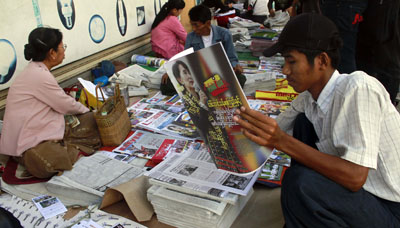Bangkok, August 1, 2012–Two weekly news publications were suspended indefinitely in Burma on Tuesday, marking a significant reversal of the government’s earlier loosening of media restrictions and pre-publication censorship, the Committee to Protect Journalists said today.
The Press Scrutiny and Registration Division (PSRD), the government’s censorship arm, suspended the Voice Weekly and Envoy news journals for violating the government’s censorship guidelines, according to news reports. The suspensions begin next week, news reports said. Tint Swe, the PSRD’s deputy director-general, said the papers had published stories that were not pre-approved by government censors, according to news reports. He did not specify which stories had caused the suspension.
Kyaw Min Swe, editor of Voice Weekly, told reporters that the PSRD did not give a specific reason for the suspensions. He speculated on his Facebook page that the action was likely in response to the latest front-page stories published by Voice Weekly and Envoy–one speculated about a possible reshuffle of five Cabinet ministers, and another featured a political cartoon that parodied PSRD board members–according to a report by Mizzima, an exile-run news website.
After announcing the suspensions, PSRD officials summoned local newspaper editors to remind them to follow the regulations of the PSRD and the 1962 Printer and Publisher Act, which requires that all publications be checked by state censors before printing. All private news publications in Burma are forced to publish in weekly format to accommodate the time-consuming pre-censorship requirements.
Authorities have suspended the Voice Weekly six times before, Kyaw Min Swe told Mizzima.
Since Thein Sein’s administration assumed power in 2011, PSRD authorities have allowed some coverage of previously banned subjects, including opposition leader and former political prisoner Aung San Suu Kyi, CPJ research shows. Information Minister Kyaw Hsan has said that the ministry planned to abolish the PSRD and the system of pre-publication censorship by the end of June, yet the PSRD has continued to pre-censor and sanction news publications, according to news reports.
“The suspension of two news weeklies raises hard questions about the sincerity and underlying motives of President Thein Sein’s democratic reform program,” said Shawn Crispin, CPJ’s senior Southeast Asia representative. “The continued censorship of news is business as usual in Burma and shows that Thein Sein’s vows to allow for more press freedom are more rhetoric than substance.”
In July, the PSRD warned two local publications, Venus and Yangon Times, that their licenses could be revoked if they continued to publish unsanctioned news about the hospitalization and poor health of former second-ranking junta member Gen. Maung Aye, according to news reports. Those threats have raised concerns among local journalists and editors that a new media bill–which will abolish censorship and establish a self-regulating Press Council–will fail to enact liberalization measures and will likely leave many of the existing strict restrictions on news reporting and publishing in place. The bill is scheduled to be debated in parliament later this month.
- For more data and analysis on Burma, visit CPJ’s Burma page here.
